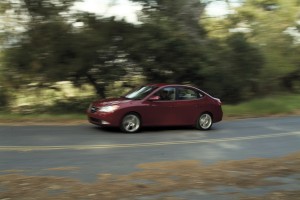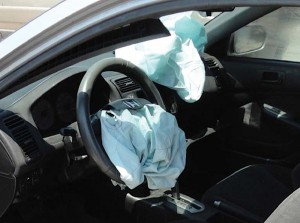Federal safety regulators have stepped up probe following the death of a Canadian motorist killed when the airbag in his Hyundai Elantra misfired during a crash in Canada last month.
The National Highway Traffic Safety Administration has already recalled tens of millions of vehicles using airbag inflators produced by troubled Japanese supplier Takata Corp., but this probe focuses on a different airbag manufacturer, ARC Automotive Inc.
The move steps up a preliminary investigation targeting the Tennessee-based ARC following several earlier incidents. NHTSA has been taking a closer look at airbags, in general, due to a series of problems that have led to numerous injuries and fatalities.
The upgraded probe is focused on at least 8 million inflators used by four major automakers – General Motors, Fiat Chrysler, Hyundai and Kia – in vehicles built through 2004. But the agency said the suspect devices may also have been used in some newer models, as well.
(Star Trek actor’s parents sue Fiat Chrysler over wrongful death. Click Here for story.)
The agency first began looking into problem with ARC airbags in July of last year, following two reported injuries involving Chrysler and Kia vehicles. Initially, the focus was on just 490,000 vehicles using inflators produced by ARC in China. It is not clear whether the system used in the vehicle involved in last month’s fatal crash had a Chinese-made inflator or one produced elsewhere.
The problem appears, at least initially, similar to what has happened in hundreds of vehicles equipped with Takata airbags. During a crash, the inflators operate over-aggressively, sending plastic and metal shrapnel spewing into the passenger compartment. More than a dozen deaths have so far been directly linked to the Takata defect.
According to NHTSA, there are “significant design differences” between the inflators used by the two companies. The suspect Takata system relies on a squib of explosive ammonium nitrate. In a crash, it is designed to ignite with just enough force to propel the airbag itself out of its storage compartment, providing a cushion that can reduce impact forces.
But research has shown that over time, especially with vehicles operated in regions with high temperatures and high humidity, the ammonium nitrate may break down and ignite improperly.
The ARC inflators are a so-called hybrid design. They use a smaller amount of that chemical propellant paired with a tank of highly compressed gas.
Last October, NHTSA ordered the recall of 27 million vehicles with Takata airbags and then added millions more this year. The final figure is uncertain but should eventually near 50 million vehicles, according to industry analysts.
The ARC probe is still in its early stages and the agency is still gathering data. Among other things, it is uncertain if the problem is limited to one or more plants or affects all of the company’s facilities using the hybrid inflator design.
Privately owned, Knoxville-based ARC produces a variety of different types of inflators at plants in the U.S., China, Mexico, Korea and Japan.
The upgraded ARC probe is raising concerns among safety advocates – many of whom have long been proponents of airbag technologies. While it is generally believed that airbags have saved thousands of lives, there is growing fear that the devices may start to malfunction over time, especially those using inflator systems powered by explosives like ammonium nitrate.
Inflator problems may be grabbing most of the headlines, but there have been a number of other recalls in recent years involving other airbag problems.
One of the largest was announced in June, Toyota recalling 1.43 million hybrid vehicles, including both the Toyota Prius and Lexus CT200h. The maker said it received seven reports of side-impact airbags firing for no known reason while the vehicles were parked.
(For more on the Toyota recall, Click Here.)
Nearly 4.5 million other vehicles have been targeted in separate recalls by General Motors, Nissan and Fiat Chrysler, just since April of this year, to repair airbags that might not trigger in the event of a crash.
The explosion in the number of faulty airbag systems has led to the rapid growth in the number of vehicles on the road with unrepaired recall defects, according to J.D. Power and Associates. The consulting firm last month estimated 45 million vehicles in operation in the U.S. have such defects. Part of the problem, Power officials noted, is that many recent recalls target older vehicles, something that can make it more difficult to track down and notify current owners.
(For more on the Power recall study, Click Here.)


